Previewing Maxiotek's MK8115 SSD Controller: Can DRAM-less Drives Make The Cut?
by Billy Tallis on May 9, 2017 8:00 AM ESTSequential Read Performance
The sequential read test requests 128kB blocks and tests queue depths ranging from 1 to 32. The queue depth is doubled every three minutes, for a total test duration of 18 minutes. The test spans the entire drive, and the drive is filled before the test begins. The primary score we report is an average of performances at queue depths 1, 2 and 4, as client usage typically consists mostly of low queue depth operations.
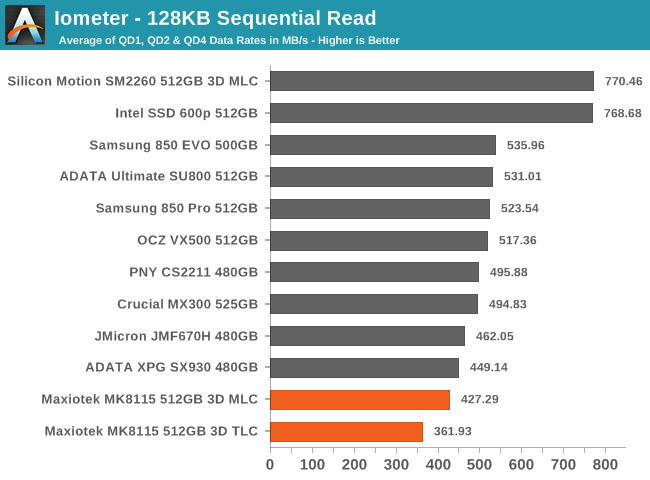
The two MK8115 drives land at the bottom of the performance rankings again for the sequential read test. They aren't really close to saturating the SATA 3 link at low queue depths, but both do at least offer significantly higher throughput than a SATA 2 link could provide, and the fact that the competition is limited by SATA 3 means the MK8115 drives fall behind by a smaller percentage than would otherwise be the case.
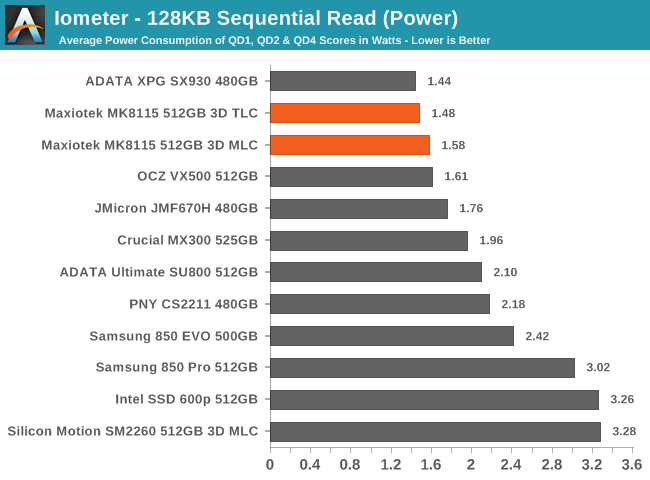
To go with their low performance the MK8115 drives offer almost the lowest power consumption, so the power efficiency is at least reasonable. The ADATA SX930 based on the JMicron JMF670H controller manages to deliver higher throughput with less power, so the lack of a DRAM cache seems to be hurting more than helping efficiency on this test.
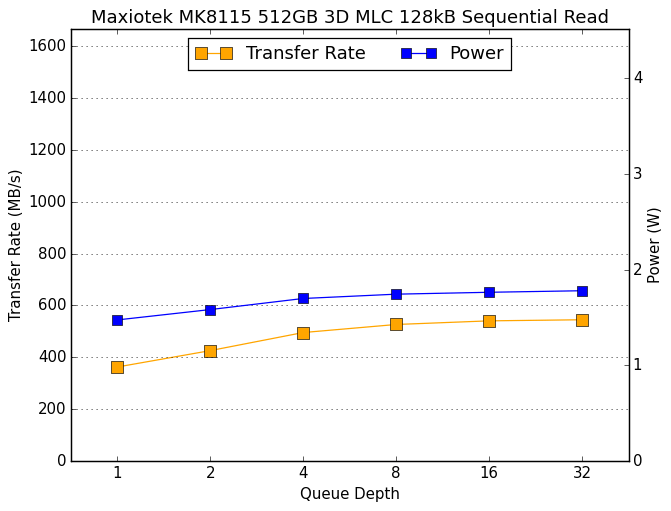 |
|||||||||
Like most SATA drives, the performance scaling as queue depth increases is mostly flat. There's slight performance growth all the up to QD16 while many SATA SSDs are able to offer their full sequential read throughput at QD2.
Sequential Write Performance
The sequential write test writes 128kB blocks and tests queue depths ranging from 1 to 32. The queue depth is doubled every three minutes, for a total test duration of 18 minutes. The test spans the entire drive, and the drive is filled before the test begins. The primary score we report is an average of performances at queue depths 1, 2 and 4, as client usage typically consists mostly of low queue depth operations.
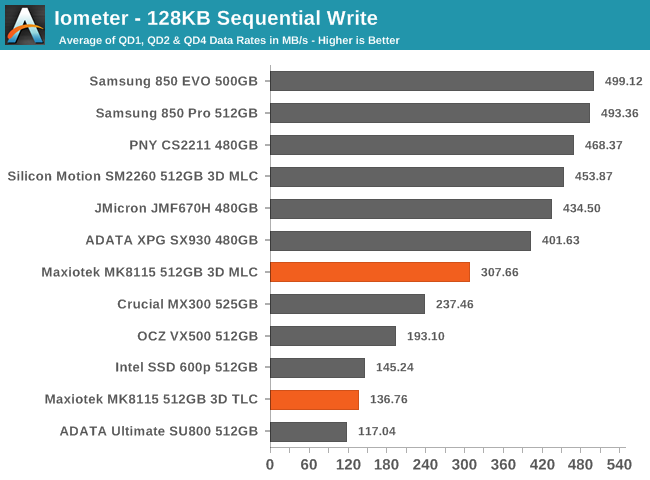
The sequential write test reveals one of the biggest gaps between the MLC and TLC based MK8115 drives. The TLC drive is almost the slowest drive on this test, but the MLC drive is more than twice as fast and outperforms most TLC SSDs while not quite matching typical MLC performance.
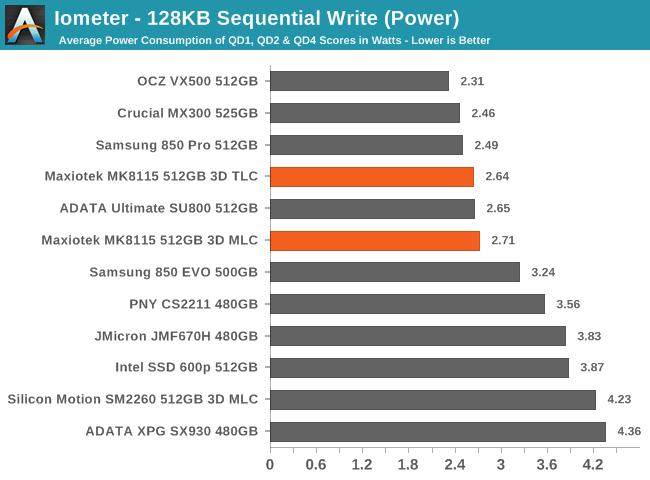
Both MK8115 drives had similar power consumption on the sequential read test, revealing the MLC drive to be far more efficient but still nothing great compared to the competition.
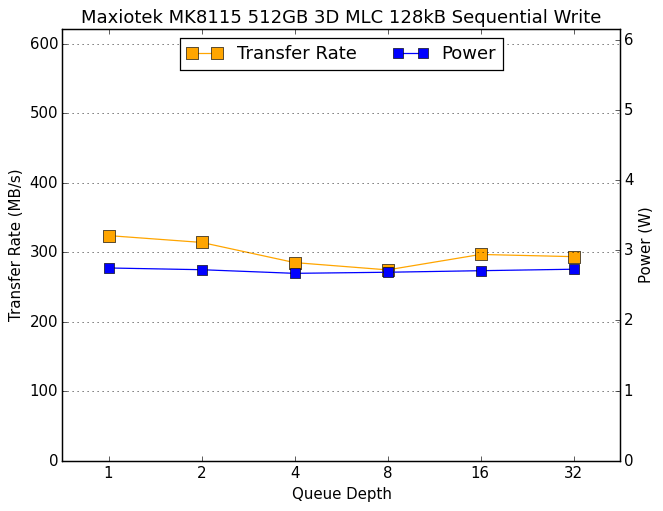 |
|||||||||
The MK8115 drive with MLC experiences a bit of trouble near the middle of the sequential write test, as write speeds drop slightly, but by the end of the test they've mostly recovered and power consumption has been constant across queue depths.










60 Comments
View All Comments
jabber - Tuesday, May 9, 2017 - link
Its like Video Recorders or DVD players. The first ones weighed 30 kilos and were built like they were made during the Industrial Revolution. By the time they stopped making them they weighed 3 kilos, had 70% fewer parts and were mostly plastic.Magichands8 - Tuesday, May 9, 2017 - link
Yep! Prices are getting higher in many cases even if they aren't dropping AND performance is either mediocre or just getting worse. Like I've said before, somewhere there are people buying such products. I don't know who they are or what's wrong withe them but I guess manufacturers are going to continue the trend for as long these people have money to lose. Even though it's dismaying to see I won't have much trouble waiting them out though. There's just very little value in most current offerings.MajGenRelativity - Tuesday, May 9, 2017 - link
I'm not sure of an instance where performance has dropped in the same price band over the past couple of years. Please feel free to enlighten meBrokenCrayons - Tuesday, May 9, 2017 - link
I'm one of those people buying such things. In my case, I was using mechanical hard disks until the middle of last year and I'm slowly (due to unusually high NAND prices) purchasing low performance SSDs for my home computers. Cheap, relatively slow SSDs still let me enjoy faster and more responsive storage. Since I'm not a power user or someone that's interested in waving around my consumer electronics like they're an extension of my reproductive organs, I have no want or need for the fastest and most expensive tier of solid state storage.While you wonder what's wrong with us for our purchases, we wonder what's wrong with you for being worried about what we buy when you can simply mind your business and buy a higher end product meant to meet your needs or desires.
MajGenRelativity - Tuesday, May 9, 2017 - link
I definitely respect your choices, as even a low-end SSD can best a HDD for metrics a typical home user would care about.melgross - Tuesday, May 9, 2017 - link
Right now, there are memory shortages. NAND shortages are expected to last until the end of the year. Then prices will begin dropping again.beginner99 - Wednesday, May 10, 2017 - link
Yeah if this continues it will take less than a year and they will actually manage to perform worse than HDDs.JimmiG - Wednesday, May 10, 2017 - link
I agree, unless you absolutely need more SSD storage right now, I'd recommend holding off until next year.MajGenRelativity - Tuesday, May 9, 2017 - link
I just hope the shortage is going to end, and we can go back to cheaper SSDs. I'm also unsure of the usefulness of this drive, but I can see it being used in systems a notch above budget systems.looncraz - Tuesday, May 9, 2017 - link
I just want a 2TB SSD that costs $200 US and performs better than a hard drive (no spin up delays, lower latency, no moving parts).I could deal with 150MB/s transfer rates and even 2ms latencies for that. Still worlds better than the hard drives I use for storage now considering I have to spin them down as they are only accessed every few hours a couple times a day (but then stream data at 40MB/s+ for a couple hours).
I would buy three without hesitation.